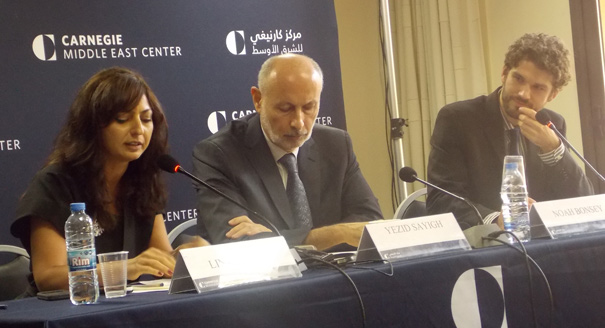Registration
You will receive an email confirming your registration.
On Tuesday, June 3, the Syrian people casted their votes for a new president amidst an ongoing civil war that has killed more than 160,000 people and displaced millions. Incumbent President Bashar al-Assad secured a victory in an election that was boycotted by opposition groups and described as a mockery by Western leaders.
The Carnegie Middle East Center hosted a public event on the Syrian presidential election. Experts discussed the election results and how they may affect prospective peace talks and the ongoing humanitarian and political crisis raging in Syria. Discussants included Noah Bonsey of the International Crisis Group and Carnegie’s Yezid Sayigh and Lina Khatib.
This event was live-streamed on Hipernation.
SYRIAN REGIME: INSIDE SYRIA
- Counter-terrorism: Despite justifying the prolonged conflict as a war against terrorism, the Assad regime has showed no real interest in fighting extremist jihadist groups, said Bonsey. ISIS has become self-sufficient, without any need for foreign help, added Khatib. She warned that, in the long run, this will seriously threaten the regime’s longevity.
- Inability to Stabilize: Given the regime’s strategy in its military advances, such as depopulation tactics with the use of barrel bombs, Bonsey explained that it is unable to act as an internal stabilizer. Successful ceasefires—such as in Homs—are difficult to replicate throughout the whole country due to the sheer amount of soldiers required, he added.
SYRIAN REGIME AND REGIONAL OPPONENTS
- Western Involvement: While the West has not been willing to fully counterbalance Iran’s commitment to support the Syrian regime, American involvement is increasing and has been sufficient enough to keep the opposition alive and fighting for two years, said Bonsey.
- Arab Gulf Involvement: Non-governmental elements in the Arab Gulf have funded Salafi jihadi groups in Syria for ideological and personal calculations, Khatib said. However, these extremist groups have become a threat for Gulf countries, which are now showing greater cooperation in the interest of security, she added.
- Iranian Nuclear Talks: In the beginning, the West was averse to discussing the Syrian issue amidst nuclear talks with Iran. Developments in the Gulf have changed the scene, and Iran is pleased to finally be on the way towards being perceived as a legitimate player in the region, said Khatib.
- Saudi-Iranian Talks: Back-channel talks have already been initiated between Saudi Arabia and Iran, which may lead to de-escalation in the region, Khatib said. This carries implicit Saudi recognition of Iran’s influence in Yemen, Bahrain, Iraq, and Lebanon.
ASSAD’S INFLUENCE
- Opposition Coordination: The regional allies of the opposition are finally attempting to coordinate more effectively, Bonsey said. Less resources are allocated to Salafi factions (i.e. Islamic Front and Ahrar al-Sham), while non-ideological groups are receiving significantly more support.
- Decreasing Influence: Assad’s regional influence appears to be decreasing while Hezbollah’s power grows. Khatib argued that this might push Iran to finally abandon Assad—though not the Syrian regime—as its regional ally. Sayigh, however, questioned whether there is any prospect for real change if Assad is unable to negotiate without the backing of a powerful ally such as Iran.
- Not Quite a Monolithic Regime: Recent developments have shown that the regime is not as monolithic as once thought, said Sayigh. Factions within the security establishment have opposing views to the political elite, he added. In many cases, leaders from within the intelligence circles are obstructing cease-fire initiatives made directly from the presidential palace.
Noah Bonsey
Noah Bonsey is a senior analyst at the International Crisis Group. Bonsey has contributed to Crisis Group’s coverage of Syria since May 2012, including the reports Anything But Politics: The State of Syria’s Political Opposition and Tentative Jihad: Syria’s Fundamentalist Opposition.
Lina Khatib
Lina Khatib is director of the Carnegie Middle East Center in Beirut. Previously, she was the co-founding head of the Program on Arab Reform and Democracy at Stanford University’s Center on Democracy, Development, and the Rule of Law.
Yezid Sayigh
Yezid Sayigh is a senior associate at the Carnegie Middle East Center in Beirut, where his work focuses on the Syrian crisis, the political role of Arab armies, security sector transformation in Arab transitions, the reinvention of authoritarianism, and the Israeli-Palestinian conflict and peace process.
